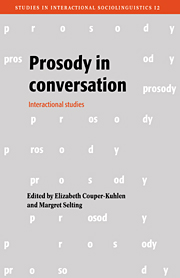Book contents
- Frontmatter
- Contents
- List of contributors
- Foreword by John J. Gumperz
- Introduction
- 1 Towards an interactional perspective on prosody and a prosodic perspective on interaction
- 2 On the prosody and syntax of turn-continuations
- 3 Ending up in Ulster: prosody and turn-taking in English dialects
- 4 Affiliating and disaffiliating with continuers: prosodic aspects of recipiency
- 5 Conversational phonetics: some aspects of news receipts in everyday talk
- 6 Prosody as an activity-type distinctive cue in conversation: the case of so-called ‘astonished’ questions in repair initiation
- 7 The prosodic contextualization of moral work: an analysis of reproaches in ‘why’-formats
- 8 On rhythm in everyday German conversation: beat clashes in assessment utterances
- 9 The prosody of repetition: on quoting and mimicry
- 10 Working on young children's utterances: prosodic aspects of repetition during picture labelling
- 11 Informings and announcements in their environment: prosody within a multi-activity work setting
- Subject index
- Index of names
7 - The prosodic contextualization of moral work: an analysis of reproaches in ‘why’-formats
Published online by Cambridge University Press: 24 November 2009
- Frontmatter
- Contents
- List of contributors
- Foreword by John J. Gumperz
- Introduction
- 1 Towards an interactional perspective on prosody and a prosodic perspective on interaction
- 2 On the prosody and syntax of turn-continuations
- 3 Ending up in Ulster: prosody and turn-taking in English dialects
- 4 Affiliating and disaffiliating with continuers: prosodic aspects of recipiency
- 5 Conversational phonetics: some aspects of news receipts in everyday talk
- 6 Prosody as an activity-type distinctive cue in conversation: the case of so-called ‘astonished’ questions in repair initiation
- 7 The prosodic contextualization of moral work: an analysis of reproaches in ‘why’-formats
- 8 On rhythm in everyday German conversation: beat clashes in assessment utterances
- 9 The prosody of repetition: on quoting and mimicry
- 10 Working on young children's utterances: prosodic aspects of repetition during picture labelling
- 11 Informings and announcements in their environment: prosody within a multi-activity work setting
- Subject index
- Index of names
Summary
Introduction
This chapter will analyse the prosodic devices used in everyday moralizing. The focus will be on reproach activities in ‘why’ - formats, as encountered in a data collection of informal talk (dinner conversations in the family, breakfast interactions, coffee chats, telephone calls between friends) and media conversation (talk-shows on TV and radio phone-ins). An analysis of my data reveals that a great number of reproaches in German are packaged in warum- or wieso- (‘why’ -) formats. This applies to reproaches which are produced in situ, that is, in the ongoing communication:
(1) warum lä:sch se au immer rei:.
why do you always let her in
well as to those which appear as reconstructions of past reproaches:
(2) ich hab der Katharina jetzt auch gesagt warum steht das ni:cht im and so I told Katharina why isn't it in the
Kulturanzeiger.
Kulturanzeiger
Even self-reproaches may be constructed with ‘why’ -formats:
(3) ich hab mir da Vorwurfe gemacht. warum hab ich ihr das gesacht.
I reproached myself, why did I tell her about it
This chapter, however, will concentrate primarily on in situ reproaches constructed in ongoing interaction.
‘Why’ -constructions are of great interest for linguistic analysis because they can represent ‘real’ questions asking for a reason:
(4) warum magst du Stuttgart nich?
why don't you like Stuttgart?
as well as reproaches focussing on another's misdeeds and demanding a ‘remedial reply’:
(5) warum zum Teufel fra:gsch se dann net direkt
why the hell don't you ask her directly then
The analytic questions then are: how do participants differentiate between a ‘why’ -question and a ‘why’ -reproach?
- Type
- Chapter
- Information
- Prosody in ConversationInteractional Studies, pp. 271 - 302Publisher: Cambridge University PressPrint publication year: 1996
- 23
- Cited by



